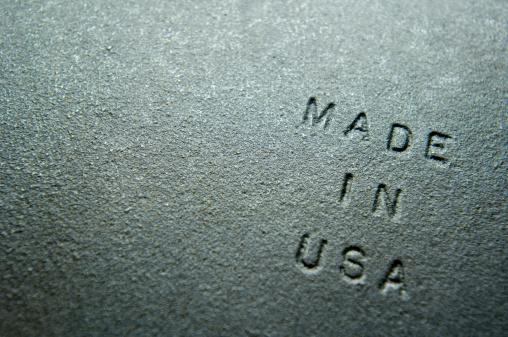Contributing Writer
- FMA
- The Fabricator
- FABTECH
- Canadian Metalworking
Categories
- Additive Manufacturing
- Aluminum Welding
- Arc Welding
- Assembly and Joining
- Automation and Robotics
- Bending and Forming
- Consumables
- Cutting and Weld Prep
- Electric Vehicles
- En Español
- Finishing
- Hydroforming
- Laser Cutting
- Laser Welding
- Machining
- Manufacturing Software
- Materials Handling
- Metals/Materials
- Oxyfuel Cutting
- Plasma Cutting
- Power Tools
- Punching and Other Holemaking
- Roll Forming
- Safety
- Sawing
- Shearing
- Shop Management
- Testing and Measuring
- Tube and Pipe Fabrication
- Tube and Pipe Production
- Waterjet Cutting
Industry Directory
Webcasts
Podcasts
FAB 40
Advertise
Subscribe
Account Login
Search
A closer look at the “Made in America” manufacturing program
The Biden administration seeks to make small and medium-sized manufacturers possible suppliers to the federal government
- By Stephen Barlas
- March 1, 2021

The Biden administration announced a new “Made in America” program to encourage the federal government to purchase more domestically made goods, but that doesn't necessarily mean that all metal manufacturers are pleased about the executive order. Getty Images
President Joe Biden’s Made in America (MIA) executive order will have some of the same negative effects on U.S. metal product manufacturers as former President Donald Trump’s steel and aluminum tariffs. The only real bottom-line difference is that the Biden plan potentially hurts only manufacturers selling to the federal government, particularly the defense department, which accounts for $600 billion in annual purchases, according to Biden.
The Trump tariffs hurt domestic manufacturers of appliances, auto parts, pipes, fasteners, and goods that were selling to other businesses in the federal and private sectors. Those tariffs remain in place.
The fact that the Biden plan has the same potential to deliver the same negative impact on domestic metal manufacturers as the Trump tariffs explains the absence of welcoming comments from affected manufacturers. Evamarie Socha, spokeswoman for the National Defense Industrial Association, said her group has no comment on the MIA executive order. The National Association of Manufacturers did not respond to requests for comment.
Their silence speaks volumes.
Biden didn’t help himself by citing inaccurate statistics meant to denigrate Trump’s MIA policy. The Washington Post’s Fact Checker awarded “four Pinocchios”—meaning the highest level of inaccuracy—to claims made by Biden at his press conference announcing the executive order. Aside from using bad numbers while damning Trump’s MIA policies, Biden also claimed it was too easy for U.S. manufacturers to get waivers from those policies to use foreign-made steel.
The claims about the ease of obtaining waivers undercut Biden’s announcement of a new Made in America Office within the Office of Management and Budget (OMB) at the White House. The new office will have to approve waivers and post the requests and decisions on a website for anyone to view. Just that new element of transparency will indirectly tamp down on exclusion requests because many of these organizations might not want to be seen as turning a cold shoulder to domestically made steel and aluminum.
Additionally, these companies likely will want to avoid having to navigate what undoubtedly will be a new bureaucracy within the OMB. Biden does allow for waivers where there is an overwhelming national security, humanitarian, or emergency need in America.
The obvious question—one that was frequently raised during discussions about the steel and aluminum tariffs—is what is the cost to the Pentagon and U.S. taxpayers if the Department of Defense and other federal agencies must buy vehicles and other products made with U.S. metal? The Biden order says nothing about federal budget impact.
Also, if U.S. defense suppliers must use domestic steel and aluminum, for example, does it mean they have to do the same because of manufacturing demands? For example, manufacturers with defense customers will seek to purchase higher-priced domestic steel for all of their projects, even those for customers outside of the defense industry, because of the impracticality of having too many metal suppliers. How will that affect the competitiveness of these metal manufacturers outside federal procurement?
The good news is that if you are a fabricator selling to the defense department and you are using domestic steel or aluminum you now will have a leg up in the contract bidding process against competitors who don’t meet the “Buy American” edict. Biden targeted small and medium-sized manufacturers as the beneficiaries of his executive order.
As a means of better connecting those small and medium-sized companies with federal contract opportunities, Biden said he wanted federal agencies “to the extent appropriate and consistent with applicable law” to partner with the Hollings Manufacturing Extension Partnership (MEP) to conduct supplier scouting to identify U.S. companies of all sizes that are able to make goods, products, and materials that meet federal procurement needs. The MEP is run out of the National Institute of Standards and Technology, an agency under the U.S. Department of Commerce. The MEP partially funds centers, often in conjunction with state government offices, in all 50 states and Puerto Rico.
subscribe now

The Fabricator is North America's leading magazine for the metal forming and fabricating industry. The magazine delivers the news, technical articles, and case histories that enable fabricators to do their jobs more efficiently. The Fabricator has served the industry since 1970.
start your free subscriptionAbout the Author

Stephen Barlas
- Stay connected from anywhere

Easily access valuable industry resources now with full access to the digital edition of The Fabricator.

Easily access valuable industry resources now with full access to the digital edition of The Welder.

Easily access valuable industry resources now with full access to the digital edition of The Tube and Pipe Journal.
- Podcasting
- Podcast:
- The Fabricator Podcast
- Published:
- 04/16/2024
- Running Time:
- 63:29
In this episode of The Fabricator Podcast, Caleb Chamberlain, co-founder and CEO of OSH Cut, discusses his company’s...
- Industry Events
16th Annual Safety Conference
- April 30 - May 1, 2024
- Elgin,
Pipe and Tube Conference
- May 21 - 22, 2024
- Omaha, NE
World-Class Roll Forming Workshop
- June 5 - 6, 2024
- Louisville, KY
Advanced Laser Application Workshop
- June 25 - 27, 2024
- Novi, MI































